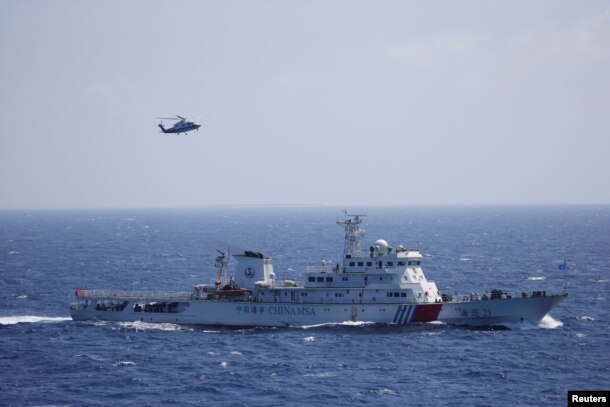By Ralph Jennings

Guided missile destroyer USS Lassen arrives at the Shanghai International Passenger Quay in Shanghai, China, for a scheduled port visit.
TAIPEI — U.S. President-elect Donald Trump did not make the maritime disputes in South China Sea a major part of his election campaign and his approach to Asia’s most expansive sovereignty disagreement is still not clear.
Some experts predict, however, that he will make a few strident anti-Beijing military moves in the area to prove a point and then back off to engage the Chinese economically.
President Trump South China Sea policy
People who follow U.S. policy in Asia expect Trump to make a quick show of force.
That show might include passage of U.S. naval ships through the 3.5 million-square-km (1.4 million-square-mile) sea to show it is open to all countries despite China’s claim to the entire body of water, said Sean King, senior vice president with the New York political consultancy Park Strategies.
They say a military move would support anti-China campaign remarks by Trump, who ran on the Republican Party ticket, and let him appear tougher than Barack Obama of the rival Democratic Party.
They say a military move would support anti-China campaign remarks by Trump, who ran on the Republican Party ticket, and let him appear tougher than Barack Obama of the rival Democratic Party.
Some in Trump’s camp may see a loss to the United States as the Philippines, a sea claimant and traditional U.S. ally, has moved closer to Beijing since June.
“He has to flex American muscle,” said Eduardo Araral, an associate professor at the National University of Singapore’s public policy school.
“He has to flex American muscle,” said Eduardo Araral, an associate professor at the National University of Singapore’s public policy school.
“He has to tell his domestic constituency he has won back the Philippines that was lost to China. So he needs to show his constituency that he has won where Obama has failed.”
Trump has yet to roll out a formal South China Sea policy.
Trump has yet to roll out a formal South China Sea policy.
The United States is not among the six claimant governments, but Obama has used verbal warnings and periodic military movements to check China, the biggest force in the dispute.
The guided missile destroyer USS Benfold arrives in port in Qingdao in eastern China's Shandong Province, Aug. 8, 2016.

The guided missile destroyer USS Benfold arrives in port in Qingdao in eastern China's Shandong Province, Aug. 8, 2016.
The New York real estate billionaire said on his campaign website that a stronger U.S. military deployment in the South China Sea would counter Chinese adventurism as Beijing tries to expand its influence.
Trump also criticized China for taking disputed islets in the sea and reclaiming land for others.
China has reclaimed an estimated 3,200 acres (1,295 hectares).
“A strong military presence will be a clear signal to China and other nations in Asia and around the world that America is back in the global leadership business,” the campaign website said.
“Details are scarce as to what Trump’s policy approach to the Asia Pacific might look like, and many of his off-the-cuff remarks have sent mixed signals about how the administration might proceed,” said Jonathan Spangler, director of the Taipei-based South China Sea Think Tank.
“A strong military presence will be a clear signal to China and other nations in Asia and around the world that America is back in the global leadership business,” the campaign website said.
“Details are scarce as to what Trump’s policy approach to the Asia Pacific might look like, and many of his off-the-cuff remarks have sent mixed signals about how the administration might proceed,” said Jonathan Spangler, director of the Taipei-based South China Sea Think Tank.
“Had Clinton won the election, there’s little doubt that she would have continued to prioritize the Asia Pacific region.”
An Asia policy might become clearer when Trump picks policy architects such as the next secretaries of state and defense, King said.
Trump takes a cold view toward free trade, a core part of Sino-U.S. ties today.
He has called China a “cheater” and a “currency manipulator.” An Asia policy might become clearer when Trump picks policy architects such as the next secretaries of state and defense, King said.
Trump takes a cold view toward free trade, a core part of Sino-U.S. ties today.

Chinese ship and helicopter are seen during a search and rescue exercise in the Paracel Islands.
Aucun commentaire:
Enregistrer un commentaire